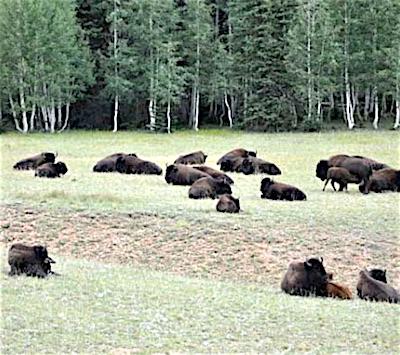
A report that concludes that bison on the North Rim of the Grand Canyon are native to the park is flawed, according to Public Employees for Environmental Responsibility/NPS photo of bison along North Rim Entrance Road
Bison are not native to Grand Canyon National Park and a report that claims they are should be withdrawn by the National Park Service and not relied upon as the park staff debates how to handle a bison herd on the North Rim, maintains Public Employees for Environmental Responsibility.
The 2015 report, known as the "Plumb Report" for its author, reversed the prior Park Service position and lacks any scientific basis, the complaint filed by PEER charges. However, its acceptance by the park "would operate to prevent complete removal of the herd from the park."
PEER is challenging the report entitled Grand Canyon National Park Bison Technical Assistance Report, commonly called the “Plumb Report” after its lead author. This 2015 report "overrode the previous NPS scientific stance that the hybridized herd introduced by a rancher in 1906 are not 'native' to the park, a PEER release said.
The Plumb Report also narrowed the options available to the Park Service – as the agency may not extirpate native animals from national parks. As a result, Grand Canyon officials are now embracing a plan pushed by the Arizona Game & Fish Commission for repeated hunts to “cull” the herd back to more manageable levels.
Citing requirements of the Information Quality Act, PEER is demanding retraction of the Plumb Report because its conclusion that this herd is native to the Grand Canyon "is not cut out of academic whole cloth":
* there is no scientific evidence that the historic range of bison ever extended down to Arizona. Even the sources cited by the Plumb Report make no such finding;
* the report ignores the Park Service’s own standards for what constitutes exotic wildlife that is supposed to be removed if the introduced species is harming park resources;
* and it bases much of its analysis on an unsupported analogy between the cattalo of Grand Canyon and the behavior of the iconic wild horses that swim at Virginia’s Assateague Island.
“These cattalo are no more native to the Grand Canyon than pythons are native to the Everglades,” said PEER Executive Director Jeff Ruch, noting that the hunters selected would be “volunteers” holding a current Arizona license, with a buffalo permit costing $1,000 for a resident and $5,000 for a non-resident. “The Park Service has improperly engaged in a results-driven review masquerading as science.”
The North Rim bison herd has a population of around 600 individuals, according to the Park Service.
"These 2,000-pound animals congregate in a small, very fragile part of the park’s North Rim where they have apparently learned they will not be hunted. This stagnant herd is harming rare plants, fouling springs and carving erosive trails into the North Rim," the non-profit added.
In 2014, Grand Canyon was developing an evaluation of alternatives which included removing the cattalo herd from the park altogether. The Plumb Report killed that plan and now the park is posting a quick assessment of the culling option favored by the state, PEER said.
Under the Information Quality Act, the Park Service has 60 days to defend the report or it must be withdrawn and its conclusions barred from use in decision making.
“To counter the uncontested fact that these cattalo were introduced by humans, this report creates a fiction that Grand Canyon is within of the historic range of the Plains bison even though there is no archaeological, biological, or cultural support for that notion,” Mr. Ruch added. “If bison had spent any time longer than a spring break at the Grand Canyon there would be some evidence of it.”
The park staff is taking public comment through Friday on what should be considered as an environmental assessment is produced on how to manage the animals.




 Support Essential Coverage of Essential Places
Support Essential Coverage of Essential Places







Comments
Since at least the 1971 barring of the Craighead brothers from Yellowstone grizzly research, so-called 'science' in the National Parks has sometimes been a thin reed in the bureaucratic winds:
https://en.wikipedia.org/wiki/Frank_and_John_Craighead